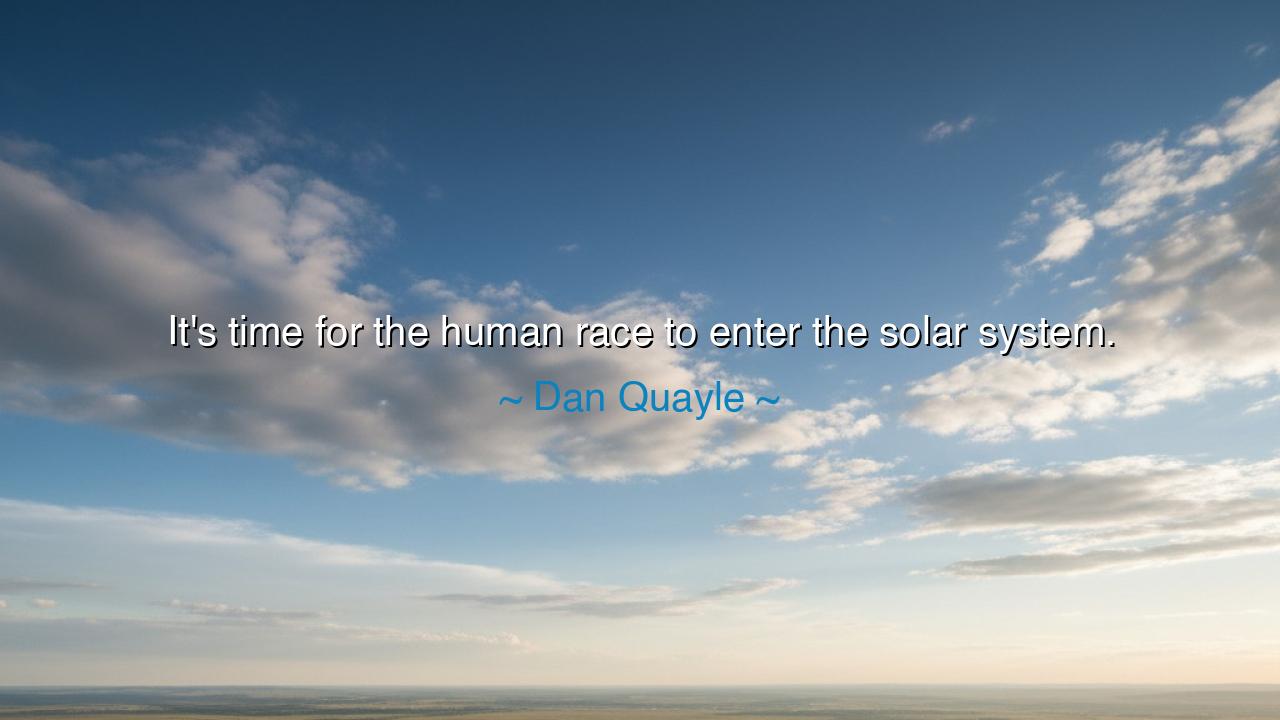
It's time for the human race to enter the solar system.






The statesman Dan Quayle, though his words were once spoken in jest and often remembered with humor, gave voice to a vision larger than he perhaps intended: “It’s time for the human race to enter the solar system.” Though the phrase may sound curious, beneath it lies a truth of deep significance—that mankind is destined not to remain bound to one small world, but to extend itself outward, to the heavens, to the stars, and to the infinite expanse that awaits. For in these words, even if uttered imperfectly, is the eternal cry of the human spirit: Go beyond.
From the dawn of time, men have lifted their eyes to the night sky. The hunter by his fire, the shepherd on the plain, the king upon his throne—all have gazed upon the stars with awe and wonder. They knew instinctively that they were not alone in a silent void, but part of a grander order, a solar system, a cosmic home woven of light and darkness. Quayle’s words, however clumsy, echo this ancient longing: to not merely behold the heavens, but to step into them, to claim them as the next chapter of human destiny.
Consider the story of Apollo 11. In the year 1969, when men first set foot upon the Moon, the world trembled in awe. Neil Armstrong’s step was not just his own, but the step of all humanity—fragile flesh upon the dust of another world. That moment was the truest fulfillment of what Quayle’s words imply: mankind entering not just the Earth’s embrace, but the broader family of worlds. And though we have walked only briefly upon that lonely satellite, the dream was lit: the dream that humanity could go farther still, to Mars, to Jupiter’s moons, perhaps one day to the edge of the solar system itself.
Yet Quayle’s saying may also be read in another light. For though humanity has always dwelt in the solar system, too often we live as though Earth alone is our concern. We poison our seas, we strip our forests, we act as though the cosmos begins and ends with our immediate desires. To “enter the solar system” in wisdom means to awaken to the vastness of our true home—to realize that Earth is but one member of a greater body, fragile and interconnected, spinning in harmony with its neighbors. To think cosmically is to live with humility, stewardship, and awe.
The deeper meaning is that humanity is at the threshold of a new age. The same boldness that carried our ancestors across oceans, that drove explorers into deserts and mountains, now calls us outward into space. To enter the solar system is not merely to conquer new frontiers but to expand the very horizon of human possibility. It is the call of courage against fear, of vision against complacency, of greatness against the smallness of comfort.
The lesson is this: we must not confine ourselves to the narrow cage of what is familiar. Whether in science, in spirit, or in daily life, we are called to step beyond, to dream greater, to risk more. The solar system becomes a metaphor for every unexplored realm of the human soul. Each of us has “moons” and “planets” yet to discover—new strengths, new talents, new dimensions of courage. To enter the solar system is to refuse stagnation and to embrace the infinite.
Practical action lies here: nurture curiosity, cherish imagination, and dare to go beyond what you know. Support the works of exploration, whether of space, of science, or of the human heart. Teach children to look upward at the stars and to believe they are not unreachable lights, but destinations waiting for brave feet. And in your own life, take each challenge as a launchpad, each obstacle as gravity to be overcome, each dream as a world waiting to be touched.
Thus, O children of tomorrow, remember Quayle’s words, imperfect though they were: “It’s time for the human race to enter the solar system.” For the time is always now—to rise, to journey, to reach beyond the familiar shores of Earth. Let these words call you, not to laughter, but to courage. For mankind’s destiny is not only to dwell upon the Earth, but to embrace the cosmos, to claim its inheritance among the stars, and to carry the flame of life wherever the light of the Sun may shine.






AAdministratorAdministrator
Welcome, honored guests. Please leave a comment, we will respond soon